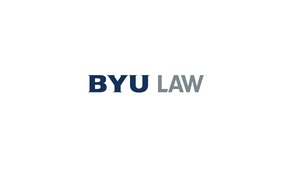Lineup to include keynote by D. Gordon Smith, linguist workshop, panel on the intersection of IP law and corpus linguistics
PROVO, Utah, Oct. 4, 2023 /PRNewswire/ -- BYU Law today announced it will hold its eighth annual Law and Corpus Linguistics Conference on October 13. The event, sponsored by Schaerr Jaffe, LLP, BYU College of Humanities and the Judicial Education Institute, will convene prominent legal and linguistics scholars, judges and industry professionals interested in furthering the discipline of corpus linguistics – the methodology for understanding the meaning of words at the time they were written by analyzing language in large collections of texts called "corpora."
"We are thrilled to host a conference that is now eight years running, in a burgeoning field that was incubated at BYU and has flourished in important ways over the years," said Thomas R. Lee, BYU Law professor and recently retired Utah Supreme Court Justice. "It will be exciting to see that borne out in presentations from a range of scholars and practitioners in the fields of both law and linguistics."
In addition to hosting this annual conference, BYU Law develops pioneering legal research corpora, and fosters influential scholarship and training using this method. Its law and corpus linguistics platform search interface has been used by thousands of researchers, including federal and state judges, and appellate attorneys. The platform enables legal professionals to analyze the meaning of words that can be applied to current cases. More than 145 legal opinions have referenced corpus linguistics since 2011, including the recent decision in Margda Pierre-Noel v. Bridges Public Charter School, which interpreted the term "transportation" in the Individuals with Disabilities in Education Act based on "customary" usage of the term in the Corpus of Historical American English.
2023 Conference Lineup
D. Gordon Smith, BYU Law professor and former dean, will deliver the keynote address, "The Corruption of Loyalty." Smith spearheaded the Law and Corpus Linguistics project during his tenure as dean of BYU Law.
"The duty of loyalty is an enigmatic concept at the core of fiduciary law. In previous work, I have argued that the duty of loyalty is best understood by reference to industry customs and social norms, not by lexicography, etymology, or, in many cases, legal precedent," said Smith. "My keynote address is a first step in using corpus linguistics to describe various properties of loyalty through the lens of history. My aim is to offer a novel extension of corpus linguistics in understanding law, showing how the usage of 'loyalty' has been corrupted, both in general speech and in legal discourse over the past 150 years."
The conference will feature several panels, including a panel on the intersection between corpus linguistics and intellectual property law moderated by Jeanne Fromer, professor of Intellectual Property Law at New York University School of Law. Event organizers also anticipate hearing from one of the authors of an amicus brief filed recently in the United States Supreme Court, on the original public meaning of "income" under the Sixteenth Amendment to the Constitution.
Conference registration is now open. Please register here.
There will also be a workshop, titled "Introduction to Corpus Linguistic Applications to Law," held Thursday from 9 a.m. to noon for linguists who are interested in learning more about legal applications of corpus linguistics. The workshop is free of charge. If you are interested, please register here.
The study of law and corpus linguistics was pioneered by BYU Law School. The Law School's work began with a student comment published in the BYU Law Review in 2010 and has continued since then through courses, conferences, publications, and, perhaps most significantly, the creation of a state-of-the-art research platform to facilitate work on law and corpus linguistics. BYU Law has benefitted from the close collaboration of legal scholars, judges, practitioners, and linguists, all of whom are intent on advancing our understanding of law through this research method.
Prior to the conference, project organizers will release the public beta of US Case law based on the Harvard Case Law Access Project as well as a public beta of the Personal Corpus, a platform that allows researchers to upload their own texts for study.
For more information about BYU Law's Law and Corpus Linguistics project, visit https://lcl.byu.edu.
About BYU Law School
Founded in 1971 with its inaugural class in 1973, the J. Reuben Clark Law School (BYU Law) has grown into one of the nation's leading law schools – recognized for innovative research and teaching in social change, transactional design, entrepreneurship, corpus linguistics, criminal justice and religious freedom. The Law School has more than 7,000 alumni serving in communities around the world. National Jurist recognized BYU Law as the #1 best-value law school in its 2021 and 2022 rankings. BYU Law also earned its highest U.S. news ranking to date, coming in at No. 22 in the U.S. News 2024 Best Law School rankings. For more information, visit https://law.byu.edu.
SOURCE BYU Law

WANT YOUR COMPANY'S NEWS FEATURED ON PRNEWSWIRE.COM?
Newsrooms &
Influencers
Digital Media
Outlets
Journalists
Opted In



Share this article